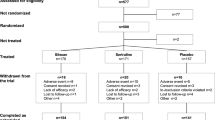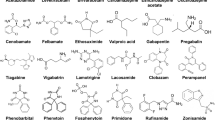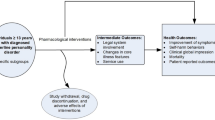Abstract
Depression is the most frequent mental disorder in older people, often causing emotional distress and reduced quality of life. Despite its clinical significance, depression remains underdiagnosed and inadequately treated in older patients. Regarding prognosis, data suggest that almost 70% of patients, treated long enough and with appropriate doses, recover from an index episode of depression. Antidepressants are efficient for treating depressed outpatients with several comorbid physical diseases as well as hospitalized patients, with selective serotonin reuptake inhibitors being the antidepressants of choice for older patients. Available data can guide pharmacological treatment in both the acute and maintenance stages, but further research is required to guide clinical strategies when remission is not achieved. Approaches for the management of resistance to treatment are summarized, including optimization strategies, drug changes, algorithms, and combined and augmentation pharmacological treatments. Finally, additional therapeutic choices such as electroconvulsive therapy, transcranial magnetic stimulation, and integrated psychotherapy are presented.
Similar content being viewed by others
References
Papers of particular interest, published recently, have been highlighted as: •• Of major importance
Blazer DG. Depression in late life: review and commentary. J Gerontol: Med Sci. 2003;58(3):249–65.
O’Connor DW. Do older Australians truly have low rates of anxiety and depression? A critique of the 1997 National Survey of Mental Health and Wellbeing. Aust New Zeal J Psychiatr. 2006;40:623–31.
Australian Bureau of Statistics. Mental Health and Wellbeing: Profile of Adults, Australia (No. ABS Catalogue No. 4326.0). Canberra: ABS; 1998.
Australian Bureau of Statistics. National Survey of Mental Health and Wellbeing: Summary of results (No. ABS Catalogue No. 4326.0). Canberra: ABS; 2008.
Baldwin R. Mood disorders: depressive disorders. In: Jacoby R, Oppenheimer C, Dening T, Thomas A, editors. Oxford textbook of old age psychiatry. Oxford: Oxford University Press; 2008. p. 529–56.
Chiu E, Ames D, Draper B, Snowdon J. Depressive disorders in the elderly: a review. In: Herrman H, Maj M, Sartorius N, editors. Depressive disorders. 3rd ed. NJ, USA: Wiley; 2009.
Cummings SM. Predictors of psychological well-being among assisted living residents. Heal Soc Work. 2002;27:293–302.
Bryant C, Jackson H, Ames D. Depression and anxiety in medically unwell older adults: prevalence of short-term course. Int Psychogeriatr. 2009;21:754–63.
Wells KB, Katon W, Rogers B, et al. Use of minor tranquilizers and antidepressant medications by depressed outpatients: results from the Medical Outcomes Study. Am J Psychiatry. 1994;151:694–700.
Bottino CMC. The challenge of treating depression in the elderly. Int Clin Psychopharmacol. 2003;18:S39–45.
van Moltke LL, Abernethy DR, Greenblatt DJ. Kinetics and dynamics of psychotropic drugs in the elderly. In: Salzman C, editor. Clinical geriatric psychopharmacology. 3rd ed. Baltimore: William & Wilkins; 1998. p. 70–93.
Baldwin RC, Anderson D, Black S, et al. Faculty of Old Age Psychiatry Working Group, Royal College of Psychiatrists. Guideline for the management of late-life depression in primary care. Int J Geriatr Psychiatry. 2003;18:829–38.
Mottram P, Wilson K, Strobl J. Antidepressants for depressed elderly. Cochrane Database Syst Ver. 2006;(1):CD003491.
Chemali Z, Chahine LM, Fricchione G. The use of selective serotonin reuptake inhibitors in elderly patients. Harv Rev Psychiatry. 2009;17:242–53.
Salzman C, Wong E, Wright BC. Drug and ECT treatment of depression in the elderly, 1996–2001: a literature review. Biol Psychiatry. 2002;52:265–84.
Weihs KL, Settle Jr EC, Batey SR, et al. Bupropion sustained release versus paroxetine for the treatment of depression in the elderly. J Clin Psychiatry. 2000;61(3):196–202.
Nelson JC, Wohlreich MM, Mallinckrodt CH, et al. Duloxetine for the treatment of major depressive disorder in older patients. Am J Geriatr Psychiatry. 2005;13(3):227–35.
Schatzberg AF, Kremer C, Rodrigues HE, et al. The Mirtazapine vs. Paroxetine Study Group. Double-blind, randomized comparison of mirtazapine and paroxetine in elderly depressed patients. Am J Geriatr Psychiatry. 2002;10(5):541–50.
Staab JP, Evans DL. Efficacy of venlafaxine in geriatric depression. Depress Anxiety. 2000;12 Suppl 1:63–8.
•• Andreescu C, Reynolds 3rd CF. Late-life depression: evidence-based treatment and promising new directions for research and clinical practice. Psychiatr Clin North Am. 2011;34(2):335–55.
Cole MG, Bellavance F, Mansour A. Prognosis of depression in elderly community and primary care populations: a systematic review and meta-analysis. Am J Psychiatry. 1999;156(8):1182–9.
Hays JC, Steffens DC, Flint EP, et al. Does social support buffer functional decline in elderly patients with unipolar depression? Am J Psychiatry. 2001;158(11):1850–5.
Reynolds 3rd CF, Frank E, Perel JM, et al. Nortriptyline and interpersonal psychotherapy as maintenance therapies for recurrent major depression: a randomized controlled trial in patients older than 59 years. JAMA. 1999;281(1):39–45.
Lenze EJ, Dew MA, Mazumdar S, et al. Combined pharmacotherapy and psychotherapy as maintenance treatment for late-life depression: effects on social adjustment. Am J Psychiatry. 2002;159(3):466–8.
Reynolds CF, Dew MA, Pollock BG, et al. Maintenance treatment of major depression in old age. N Engl J Med. 2006;354:1130–8.
Carvalho AF, Machado JR, Cavalcante JL. Augmentation strategies for treatment-resistant depression. Curr Opin Psychiatry. 2009;22(1):7–12.
Alexopoulos GS et al. The expert consensus guideline series. Pharmacotherapy of depressive disorders in older patients. Postgrad Med. 2001; Spec No Pharmacotherapy: 1–86.
Alexopoulos GS, Katz IR, Bruce ML, et al. Remission in depressed geriatric primary care patients: a report from the PROSPECT Study. Am J Psychiatry. 2005;162(4):718–24.
•• Shelton RC, OO, Heinloth AN, Corya SA. Therapeutic options for treatment-resistant depression. CNS Drugs. 2010;24(2):131–161. A recent paper about therapeutic options for treatment-resistant depression.
Mulsant BH, et al. Pharmacological treatment of depression in older primary care patients: the PROSPECT algorithm. Int J Geriatr Psychiatry. 2001;16(6):585–92.
Bauer M, Pfennig A, Linden M, Smolka MN, et al. Efficacy of an algorithm-guided treatment compared with treatment as usual: a randomized, controlled study of inpatients with depression. J Clin Psychopharmacol. 2009;29(4):327–33.
Steffens DC. The Duke somatic treatment algorithm for geriatric depression (STAGED) approach. Psychopharmacol Bull. 2002;36(2):58–68.
Whyte EM, et al. Geriatric depression treatment in nonresponders to selective serotonin reuptake inhibitors. J Clin Psychiatry. 2004;65(12):1634–41.
Flint AJ, Rifat SL. A prospective study of lithium augmentation in antidepressant-resistant geriatric depression. J Clin Psychopharmacol. 1994;14(5):353–6.
Papakostas GI, Worthington 3rd JJ, Iosifescu DV, Kinrys G, Burns AM, Fisher LB, et al. The combination of duloxetine and bupropion for treatment-resistant major depressive disorder. Depress Anxiety. 2006;23(3):178–81.
Favas M. Augmentation and combination strategies for complicated depression. Clin Psychiatry. 2009;70(11):40.
Ross J. Discontinuation of lithium augmentation in geriatric patients with unipolar depression: a systematic review. Can J Psychiatry. 2008;53(2):117–20.
deBattista C. Augmentation and combination strategies for depression. J Psychopharmacol. 2006;20(3):11–8.
Joffe RT, Singer W. A comparison of triiodothyronine and thyroxine in the potentiation of tricyclic antidepressants. Psychiatry Res. 1990;32(3):241–51.
Fleurence R, Williamson R, Jing Y, Kim E, Tran QV, Pikalov AS, et al. A systematic review of augmentation strategies for patients with major depressive disorder. Psychopharmacol Bull. 2009;42(3):57–90.
Lavretsky H, et al. Combined treatment with methylphenidate and citalopram for accelerated response in the elderly: an open trial. J Clin Psychiatry. 2003;64(12):1410–4.
Van der Wurff FB, Stek ML, Hoogendijk WL, et al. Electroconvulsive therapy for the depressed elderly. Cochrane Database Syst Rev. 2003;(2):CD003593).
Sienaert P. What we have learned about electroconvulsive therapy and its relevance for the practising psychiatrist. Can J Psychiatry. 2011;56(1):5–12.
Fabre I, Galinowski A, Oppenheim C, et al. Antidepressant efficacy and cognitive effects of repetitive transcranial magnetic stimulation in vascular depression. Int J Geriatr Psychiatry. 2004;19(9):833–42.
Manes F, Jorge R, Morcuende M, et al. A controlled study of repetitive transcranial magnetic stimulation as a treatment of depression in the elderly. Int Psychogeriatr. 2001;13(2):225–31.
Mosimann UP, Schmitt W, Greenberg BD, et al. Repetitive transcranial magnetic stimulation: a putative add-on treatment for major depression in elderly patients. Psychiatry Res. 2004;126(2):123–33.
Jorge RE, Moser DJ, Acion L, et al. Treatment of vascular depression using repetitive transcranial magnetic stimulation. Arch Gen Psychiatry. 2008;65(3):268–76.
Bauer M, Bschor T, Pfennig A, et al. World Federation of Societies of Biological Psychiatry (WFSBP) guidelines for biological treatment of unipolar depressive disorders in primary care. World J Biol Psychiatry. 2007;8(2):67–104.
Adli M, Bauer M, Rush AJ. Algorithms and collaborative-care systems for depression: are they effective and why? A systematic review. Biol Psychiatry. 2006;59:1029–38.
National Institute for Health and Clinical Excellence. Depression: management of depression in primary and secondary care. NICE; 2004.
Keller MB, McCullough JP, Klein DN, et al. A comparison of nefazodone, the cognitive behavioral-analysis system of psychotherapy, and their combination for the treatment of chronic depression. N Engl J Med. 2000;342:1462–70.
Friedman MA, Detweiler-Bedel JB, Leventhal HE, et al. Combined psychotherapy and pharmacotherapy for the treatment of major depressive disorder. Clin Psychol Sci Pract. 2004;11:47–68.
Pampallona S, Bollini P, Tibaldi G, Kupelnick B, Munizza C. Combined pharmacotherapy and psychological treatment for depression: a systematic review. Arch Gen Psychiatry. 2004;61:714–9.
Fava GA, Ruini C. What is the optimal treatment of mood and anxiety disorders? Clin Psychol Sci Pract. 2005;12:92–6.
•• Oestergaard S, Møldrup C. Improving outcomes for patients with depression by enhancing antidepressant therapy with non-pharmacological interventions: a systematic review of reviews. Public Health. 2011;125:357–67. Recent systematic review about combined therapy: pharmacological and non-pharmacological interventions.
Alexopoulos GS, Salzman C. Treatment of depression with heterocyclic antidepressants, monoamine oxidase inhibitors, and psychomotor stimulants. In: C. Salzman, editor. Clinical geriatric psychopharmacology. Baltimore: Williams & Wilkins; 1998. p. 184–244.
Small GW, Salzman C. Treatment of depression with new and atypical antidepressants. In: C. Salzman, editor. Clinical geriatric psychopharmacology. Baltimore: Williams & Wilkins; 1998. p. 245–61.
Acknowledgements
Disclosure
Dr Bottino has served as a board member of Pfizer, has received payment for the development of educational presentations from Pfizer and Janssen-Cilag, and has had travel/accommodation expenses reimbursed by Janssen-Cilag.
Drs Barcelos-Ferreira and Ribeiz reported no potential conflicts of interest relevant to this article.
Author information
Authors and Affiliations
Corresponding author
Rights and permissions
About this article
Cite this article
Bottino, C.M.C., Barcelos-Ferreira, R. & Ribeiz, S.R.I. Treatment of Depression in Older Adults. Curr Psychiatry Rep 14, 289–297 (2012). https://doi.org/10.1007/s11920-012-0281-z
Published:
Issue Date:
DOI: https://doi.org/10.1007/s11920-012-0281-z
Keywords
- Depression
- Aging
- Older adults
- Comorbidity
- Polypharmacy
- Antidepressants
- Tricyclic antidepressants
- Selective serotonin reuptake inhibitors
- Serotonin and norepinephrine reuptake inhibitors
- Monoamine oxidase inhibitors
- Adverse effects
- Treatment
- Resistance to treatment
- Recovery
- Electroconvulsive therapy
- Transcranial magnetic stimulation
- Integrated psychotherapy




